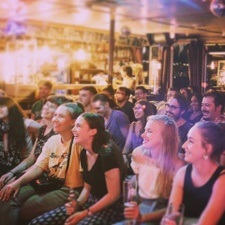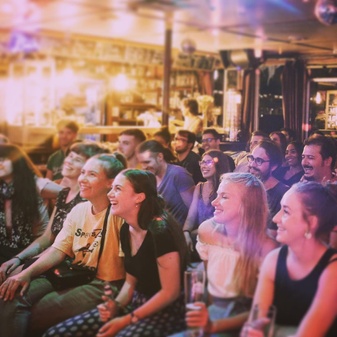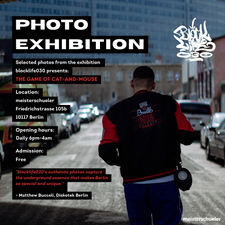Sabine Weiss. A Photographer’s Life
Das sagt der/die Veranstalter:in:
Anlässlich des 100. Geburtstages der französisch-schweizerischen Fotografin Sabine Weiss (1924–2021) zeigt f³ – freiraum für fotografie erstmals in Deutschland eine Retrospektive ihrer Arbeit.
Neben Robert Doisneau, Willy Ronis und Brassaï ist Sabine Weiss eine der wichtigsten Vertreter*innen der französischen humanistischen Fotografie. Diese Bewegung, die ihre Blütezeit nach dem Zweiten Weltkrieg erlebte, zeichnete sich dadurch aus, dass sie das Leben und den Alltag der arbeitenden Klasse einfühlsam darstellte.
Sabine Weiss (geb. Weber) wurde 1924 in Saint-Gingolph in der Schweiz geboren. Sie absolvierte eine Lehre als Fotografin im Studio des renommierten Fotografen Paul Boissonnas in Genf und ließ sich anschließend in Paris nieder, wo sie dem deutschen Modefotografen Willy Maywald assistierte. Nach ihrer Heirat mit dem amerikanischen Maler Hugh Weiss arbeitete sie ab 1950 als freischaffende Fotografin und trat 1952 der Agentur Rapho bei. Ihre Aufnahmen wurden unter anderem in The New York Times, Life, Newsweek, Vogue, Le Ore, Paris Match, Esquire, Holiday und Du publiziert. Weiss realisierte über 170 Einzelausstellungen und war mit ihren Fotografien in mehr als 80 Gruppenausstellungen vertreten, u. a. in Edward Steichens berühmter Schau The Family of Man im Museum of Modern Art in New York im Jahr 1955. Fast siebzig Jahre lang arbeitete sie für die internationale Presse, aber auch für zahlreiche Institutionen und Marken.
Ende der 1970er Jahre profitierte ihr Schaffen von der wachsenden Anerkennung der humanistischen Fotografie der Nachkriegszeit durch Festivals und Institutionen. Die internationale Aufmerksamkeit veranlasste sie, ein neues persönliches Werk in Schwarz-weiß zu entwickeln, das sich durch eine Bildsprache auszeichnet, die Einsamkeit, Glauben und die nachdenklichen Momente des Lebens in den Mittelpunkt stellt.
In den vergangenen zehn Jahren erlangte die Arbeit von Sabine Weiss einen beeindruckenden Bekanntheitsgrad: 2016 und 2018 wurde sie mit zwei Ausstellungen im Jeu de Paume Château de Tours und im Musée National d’Art Moderne im Centre Pompidou in Paris geehrt. 2020 war sie die Gewinnerin des Women In Motion Award for photography, der ihr von Kering und den Rencontres d’Arles verliehen wurde. 2021 folgte eine vielbeachtete Retrospektive im Rahmen des Fotografie-Festivals in Arles und 2022 im Casa dei Tre Oci in Venedig. Ihr Nachlass wird von Photo Elysée in Lausanne betreut und umfasst rund 160.000 Negative, 7.000 Kontaktbögen, 8.000 Prints, 46.000 Diapositive und diverses Dokumentationsmaterial.
A Photographer’s Life beleuchtet eine fotografische Karriere, die von einer unstillbaren Neugier auf andere Menschen angetrieben wurde. Sabine Weiss sah jeden Bereich der Fotografie, ob Reportage, Illustrationen, Mode, Werbung, Porträts oder persönliche Arbeiten als Herausforderung an. Fotografie war für sie Vorwand zum Reisen, zur Begegnung mit Menschen, Lebenseinstellung und Mittel zum Selbstausdruck. Die Ausstellung, an der die Fotografin bis zu ihrem Tod mitgewirkt hat, berichtet von dieser lebenslangen Leidenschaft.
Kuratorin der Ausstellung ist die Fotohistorikerin Virginie Chardin. Die Ausstellung wird organisiert von f³ – freiraum für fotografie, produziert von Sabine Weiss Studio und Photo Elysée, mit der Unterstützung von Jeu de Paume, Les Rencontres d’Arles und Women In Motion, einem Programm von Kering zur Förderung von Frauen in Kunst und Kultur.
//
To mark the centenary of photographer Sabine Weiss’s birthday (1924-2021), f³ – freiraum für fotografie is showing a retrospective of her work for the first time in Germany.
Alongside Robert Doisneau, Willy Ronis and Brassaï, Sabine Weiss is one of the most important representatives of French humanist photography. This movement, which flourished after the Second World War, is known for its sensitive portrayal of the working class on the street and in their everyday lives.
Sabine Weiss (née Weber) was born in Saint-Gingolph, Switzerland, in 1924. She completed an apprenticeship as a photographer in the studio of the renowned photographer Paul Boissonnas in Geneva and then settled in Paris, where she assisted the German fashion photographer Willy Maywald. After marrying the American painter Hugh Weiss, she worked as a freelance photographer from 1950 and joined the Rapho agency in 1952. Her photographs have been published in The New York Times, Life, Newsweek, Vogue, Le Ore, Paris Match, Esquire, Holiday and Du, among others. Weiss has held over 170 solo exhibitions and her photographs have been included in more than 80 group shows, including Edward Steichen’s famous exhibition The Family of Man at the Museum of Modern Art in New York in 1955. For almost seventy years she worked for the international press, but also for numerous institutions and brands.
In the late 1970s, her artistic creation benefited from the growing recognition of post-war humanist photography by festivals and institutions. The international attention prompted her to develop a new personal body of work in black and white, characterized by a visual language that focuses on solitude, faith and the reflective moments of life.
Over the past ten years, the work of Sabine Weiss has achieved an impressive level of recognition: In 2016 and 2018, she was honored with two exhibitions at the Jeu de Paume Château de Tours and the Musée National d’Art Moderne at the Centre Pompidou in Paris. In 2020, she was the winner of the Women In Motion Award for photography, which was presented to her by Kering and the Rencontres d’Arles. This was followed in 2021 by a highly acclaimed retrospective as part of the photography festival in Arles and in 2022 at the Casa dei Tre Oci in Venice. Her estate is managed by Photo Elysée in Lausanne and includes around 160,000 negatives, 7,000 contact sheets, 8,000 prints, 46,000 slides and various documentation materials.
A Photographer’s Life illuminates a photographic career that has always sympathized with human beings. Sabine Weisssaw every area of photography, whether reportage, illustration, fashion, advertising, portraits or personal work, as a challenge. For her, photography was an excuse to travel, to meet people, a way of looking at life and a means of self-expression. The exhibition, on which the photographer worked until her death, tells of this lifelong passion.
The exhibition is curated by photo historian Virginie Chardin. The exhibition is organized by f³ – freiraum für fotografie, produced by Sabine Weiss Studio und Photo Elysée, with the support of Jeu de Paume, Les Rencontres d’Arles and Women In Motion, a Kering program to shine light on women in the arts and culture.













